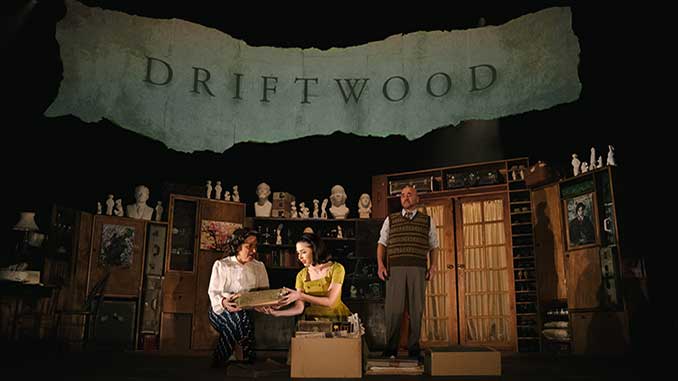 Driftwood – The Musical is a theatrical adaptation of Eva de Jong-Duldig’s memoir, spearheaded by her daughter, Tania de Jong. Listed as ‘Producer, Creator and Lyricist’, de Jong also plays Eva in the show. It’s a casting gimmick that explains the show’s tendency to oversimplify the people it seeks to represent – Austrian/Australian sculptor Karl Duldig and artist, Slawa Horowitz-Duldig.
Driftwood – The Musical is a theatrical adaptation of Eva de Jong-Duldig’s memoir, spearheaded by her daughter, Tania de Jong. Listed as ‘Producer, Creator and Lyricist’, de Jong also plays Eva in the show. It’s a casting gimmick that explains the show’s tendency to oversimplify the people it seeks to represent – Austrian/Australian sculptor Karl Duldig and artist, Slawa Horowitz-Duldig.
We open in Melbourne in 1956. Eva (Sara Reed) has just turned eighteen. Without reason, she decides to question her parents on their family history. ‘Something’, she declares, ‘is missing’; a non-descript motivation she will return to throughout the show. Her father, Karl (Anton Berezin) offers her an answer by way of a box of archival material.
The intersecting histories which she consequently encounters, and from which Driftwood – The Musical is based, are interesting on their own. Early on we learn that Slawa patented a design for the portable umbrella in 1929 and, later, that Karl constructed the Hakoa monument now standing in Tel Aviv to commemorate the Jewish athletes lost in the Holocaust.
But the show’s creators quickly mine these historical tit bids for emotional acuity before moving on. As such, many moments are simplified, and any wider repercussions they may have for plot or character are quickly glossed over.
The details that might legitimise a memoir crowd a musical, and Driftwood fires through its foundational history without considering the possible thematic threads that might tie it all together. The result is a show that presents the key beats in the lives of its subjects with such a speed as to strip them of any nuance or emotional significance.
For much of Act One, Eva functions as the expository force needed to introduce these beats, with little characterisation of her own. Any character arc one might intuit is the result of Reed’s talent as an actress. Anthony Barnhill’s compositions show promise, and moments of ensemble singing are often well-crafted.
However, the musical numbers that follow Eva’s exposition feature hackneyed lyrics. In one of the show’s more frustrating numbers, Slawa and her sister, Rella (Michaela Burger) justify thirty years of not seeing each other with the repeated claim that ‘it is hard’.
A concluding monologue about the inherent value of art represents one last mawkish attempt on the part of the show to moralise itself in a way that subsumes the experiences it just recounted into sweeping generalisations.
When Dritfwood turns to Austria in 1939 and an impending war that will ultimately erase the Jong-Duldig family line, its commitment to such generalisations becomes harder to swallow. Moments of suspense grounded in World War Two atrocities are overwrought, wrung dry for sentiment and emotional resonance. The possibility of anchoring such plot-points in conceptually interesting ideas are frustratingly undeveloped or simply unexplored.
Slawa’s commitment to the objects in her home, her inability to create art during the war and Eva’s relationship to her mother’s materialism, offer dramatically rich territory that the show toys with but ultimately abandons. Instead, we follow these characters as they flee their homes with what is a surface-level commitment to interrogating its deeper repercussions.
Director Gary Abrahams tries to construct moments of emotional acuity despite the show’s faults. His arresting tableaus and well-choreographed blocking face an uphill battle against a torpid book to achieve any affective resonance.
Jacob Battista’s Set Design faces a similar problem. Projecting archival material on a screen that appears like a ripped piece of paper is an incredibly evocative idea that is executed beautifully before being quickly overused to sentimentalise a meandering second act.
Despite the faults of the show, this talented cast find ways to shine. Anton Berezin and Michaela Burger offer spectacular vocal performances. As Rella, Burger imbues her character with a vivid inner life that is magnetic to watch. Reed, while not as talented a vocalist, tackles the incongruous twists and turns written for her character with aplomb.
And starring in multiple roles, Troy Sussman finds a way to breathe much needed humour into the script. Unfortunately, Tania de Jong’s turn as Slawa appears glaringly wooden next to these performances, and it is clear Abrahams has tried to resolve her weaknesses as an actress with strict blocking and movement choices.
Driftwood – The Musical has centred Australia’s Jewish history in a way that should be applauded. Should one be prompted to investigate the stories it represents after the curtain falls, perhaps it could be counted as a success. As it stands, more work is needed for success to be counted purely on the back of the show alone.
Driftwood – The Musical
Chapel Off Chapel, 12 Little Chapel Street, Prahran
Performance: Friday 20 May 2022
Season continues to 28 May 2022
Bookings: www.chapeloffchapel.com.au
For more information, visit: www.driftwoodthemusical.com.au for details.
Image: Driftwood – The Musical – photo by Cameron Grant, Parenthesy
Review: Guy Webster
